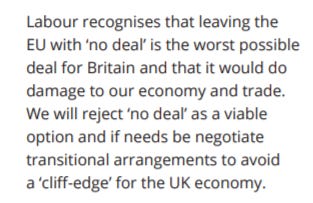The Cross-Party Revoke or No Deal Motion
This is the motion:
If, on the day before the end of the penultimate House of Commons sitting day before exit day, no Act of Parliament has been passed for the purposes of section 13(1)(d) of the Withdrawal Act, Her Majesty's Government must immediately put a motion to the House asking it to approve 'No Deal' and, if the House does not give its approval, Her Majesty's Government must ensure that the notice given to the European Council under Article 50, of the United Kingdom's intention to withdraw from the European Union, is revoked in accordance with United Kingdom and European Union law.
It is sponsored by a cross party group of senior MPs from the Conservatives, Labour, SNP, TIG, Lib Dem, and Plaid Cymru. And what it says, stripping away formality, is: if all other alternatives have fallen away, such that the only options left open to the United Kingdom are No Deal and Revoke the choice between the two is one that Parliament rather than the Prime Minister must make. And it should command considerable cross-party support. For Conservative MPs it makes good on the promise that the Prime Minister made to the House of Commons yesterday:
"unless this House agrees to it, no deal will not happen."
For Labour MPs it offers the prospect of delivering on their 2017 Manifesto which stated:

And Labour has continued to ask the Conservative Party to rule out No Deal. The Motion should also be acceptable to supporters of the current draft of the Withdrawal Agreement - or some other version thereof such as Norway + or Labour's preferred withdrawal agreement. It leaves those options available if Parliament approves them - it only applies if they fall away. Nor does it preclude a general election. Because it applies on the penultimate day before exit day - which is a moving target that depends on what we are able to agree with the EU Council - it leaves the door ajar to a General Election. But most of all, it should appeal to democrats. The decision of generational importance for the United Kingdom - between Revoke and No Deal - ought to be one for the representatives of the People in Parliament, and not for the Prime Minister, still less the Prime Minister of a minority Government. And this point is all the more important when one appreciates that Parliament has previously voted to reject No Deal. No constitution founded, as ours is, on the bedrock of the supremacy of Parliament, should contemplate a Prime Minister taking a decision such as this in the face of a clear majority of MPs.

